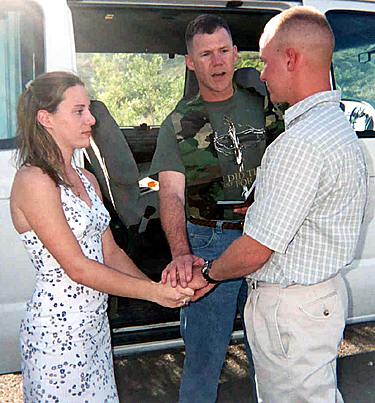LAKELAND— They knew the telephone calls were coming, but that
didn’t make them any easier to receive.
Several Florida Conference pastors, who are also chaplains in the
armed forces, were activated during the war with Iraq.
The Rev. Dr. Jim Fogle-Miller, a lieutenant colonel in the Florida
Army National Guard, a reserve component of the United States Army,
received a call Feb. 2 that another chaplain was unable to serve.
Fogle-Miller would have to go instead and was activated Feb. 4. He
arrived at Fort Benning, Ga., Feb. 6 and then Kuwait Feb. 17, serving
with the 32nd Army and Air Missile Defense Command. He returned to the
United States late last May.
Fogle-Miller, a co-pastor with his wife, Beth, at St. John’s
United Methodist Church in Winter Haven, found himself coordinating
religious ministries for 7,000 soldiers and supervising a 12-unit
ministry team, with each unit responsible for providing religious
support to the command and other units in the area that did not have
direct chaplain support. He said it was difficult to walk around the
compound and not find soldiers who wanted to talk about the looming
war, which began mid-March.
“There were people who were dealing with the anxiety of not
knowing what was coming, issues of faith and working through being
separated from their families,” said Fogle-Miller, who has a
daughter, Carlene, 12. “We knew they had missiles, but didn’t know
when and how they would use them.”
While there was some uncertainty about what would happen during the
war, the Rev. David Fuller knew exactly what he would say when the
time came for him to inform Florida chaplains they were being
activated or deployed. The pastor of St. Andrew’s United Methodist
Church in Tampa is a colonel and the command chaplain for the Florida
Army National Guard.
Fuller developed a decision matrix late last year to guide him
through the process of notifying chaplains of their status. He wanted
to provide factual, concrete information because he said he knew the
chaplains were riding a “roller coaster wave” with daily news
reports.
“It depended on where they were emotionally when I called,”
Fuller said. “Some were almost excited and others just asked, ‘why
me?’ I was able to work through it with them, but I never called any
chaplain until I knew for sure what the situation was.”
|

|
|
Photo
by Specialist Billy Knieriem |
| TEXAS - The Rev. George Troy Ray III, center, a major in the Army National Guard, performs a wedding ceremony at Fort Bliss, Texas for a soldier about to deploy overseas. Ray was ordained an elder at the 2003 Florida Annual Conference Event while home on leave and has since returned to Fort Bliss where he is expected to remain for the coming months. |
The Rev. George Troy Ray III, pastor of Trinity United Methodist
Church in Seville, received an alert notice March 1 that he would soon
be deployed. He and his wife had a short amount of time to find and
purchase a house, so the parsonage in which they were living would be
available for his replacement. The major in the Army National Guard
was told he would be gone for a minimum of one year, leaving his wife,
Tammy, and children, Karissa, 16, Nathan, 14 and Lauren, 12.
Shortly after the house was purchased, Ray was deployed to Fort
Bliss, Texas, where he remains. He is stationed with 1st Battalion,
265th Air Defense Artillery, headquartered in Daytona Beach.
Ray struggled with the role the military would play in the war.
“I guess what I have worked out from scripture is that God does
not delegate the right to take human life to any individual,” he
said. “At the same time, though, I see governments as institutions
that are given both divine responsibilities—providing for the
unfortunate ones and providing security, even if it means war.”
In a Sept. 16, 2002, statement from Florida Conference Bishop
Timothy W. Whitaker about the United States entering into war with
Iraq Whitaker said: “The reason that war should be waged only as a
last resort when there are no other plausible solutions is because war
always has long-term unforeseen consequences.
“One could imagine the deaths of many young Americans and Iraqi
civilians in the residential areas of Baghdad, the severe disruption
of the global economy, heightened tensions or new violence in the
Middle East, and the eventual collapse of governments friendly to our
country in the region.”
Ray said the message struck a chord.
“I read Bishop Whitaker’s statement on the war very carefully
and thought it was a very thought-provoking response,” he said. “In
all honesty, I never seriously considered refusing to serve. I took an
oath that reflects on my own integrity as a citizen and as a
Christian. And while some of my personal opinions about the politics
of this war may not be consistent with those of others of my soldier
peers, I remain a soldier under orders and have tried to be
conscientious about carrying them out to the best of my ability and
within the dictates of my conscience.”
Ray’s primary responsibility as chaplain is debriefing returning
soldiers on the impact of going home. He said returning from
deployment even when combat is not involved requires a great amount of
emotional decompression.
When it’s Ray’s turn to return home, he will follow his own
advice.
“Be patient, don’t try to jump back into old roles too quickly,”
Ray said. “And expect that it can take as long as the period of your
deployment before things have normalized.”